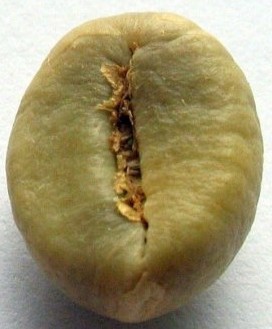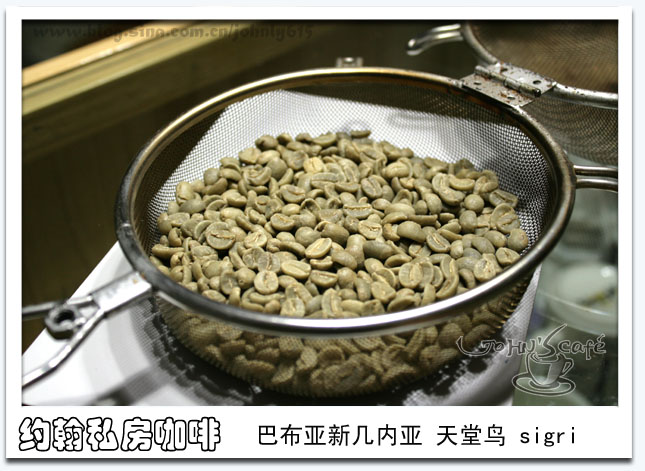Let's talk about the benefits and characteristics of robusta coffee beans that you've never known before.
People always habitually look at things in dichotomy, good and bad, good and evil, good and bad. The same is true in the world of coffee. "arabica" coffee beans are always classified as "good", while its distant relative "Robusta" coffee beans are often classified as "bad". We may describe it this way: if Arabica is a gift from angels, Robusta is like the booger of the devil, always despised and spurned by coffee gluttons.
Why is Robusta so notorious? Robusta beans, which are round in appearance and look like soybeans at first glance, are also known as thick and strong beans. They have strong resistance to diseases and insect pests, large output and low price. The boutique coffee industry used to have a very poor impression of Robusta because it usually does not have a charming and meticulous flavor. The bigger problem is that because the setting is a low-cost product, most of the planting methods are very rough, resulting in a bad smell. It often smells like dirt, dirt, and sometimes even a smell like charred tires and burning plastic. Ten years ago, I had a chance to taste several cheap Vietnamese robusta beans, some of which were unforgettable because they were like charred wheat tea flavored with tires, and I couldn't help spitting them out with the other nine bad flavors. I don't want another sip.

Wow! If Robusta beans are so bad, why talk about it? That's a good question! As mentioned at the beginning of this article, everything has its advantages and disadvantages. Good beans take you to heaven, rotten beans let you hang your heart! This is true of Arabica, and Robusta is no exception! In fact, under the tide of boutique coffee in recent years, exquisite robusta beans with high standard treatment have appeared in the world! The representative of boutique India Kappi Royale beans is India's Robusta (Robusta "Kappi Royale" Robusta).
Kappi Royale means "top grade". At present, there are at least four (and growing) private coffee farms in India to grow and produce high-quality "Coffee Royal" and "Kappi Royale" Robusta coffee beans with refined Arabica standards and procedures! It includes exquisite full water washing treatment and Pulp Natural mucosal drying semi-washing treatment which is popular in recent years. The advent of the "Coffee Royal" grade exquisite Robusta beans has undoubtedly begun to change the world's impression of Robusta! Most people who have drunk it will be surprised by its thick and clean characteristics. Because of the exquisite planting and handling procedures, the flavor of the Royal Coffee Robusta is mostly quite clean, without the intrusive flavor of the cheap Robusta (off-flavors). The Robusta is born without the elegant aroma of Arabica beans, replaced by a thicker, calmer taste, as well as strong walnut, peanut, hazelnut and wheat flavors like peanut butter and hazelnut.
India's "Coffee Royal" grade Robusta currently produces very little, but it has begun to attract the attention of the elite of the boutique coffee industry all over the world. Italian coffee expert David Schumann C. Schomer's famous Seattle-based Espresso Vivace began adding 14% of India's "Royal Coffee" Robusta to its Italian formula beans as early as a decade ago. Paradise Roasters, the national coffee evaluation points champion roaster, took the lead in the North American boutique coffee market, launching 100% Indian CxR espresso in 2009, and received a Coffee Review rating of 90 and 91 points in 2009 and 2010! It proves that Robusta is not what it used to be!
Incidentally, the price of Robusta is not cheap, even more expensive than many Elaraby beans! So, from now on, please stop saying: Robbins are rotten beans-after all, times have changed! With the emergence and gradual attention of high-quality Robusta, it is bound to cause some chain reactions and changes to the boutique coffee culture (to be continued).
Note: David C.Schomer cancelled the addition of Robusta beans to 100% arabica formula in the second quarter of 2009, which you don't know about Robusta (2).
Source: Renren
Important Notice :
前街咖啡 FrontStreet Coffee has moved to new addredd:
FrontStreet Coffee Address: 315,Donghua East Road,GuangZhou
Tel:020 38364473
- Prev

How to correctly identify robusta coffee beans and correctly understand their characteristics, uses and benefits
[introduction] "Robusta" coffee is commonly known as "sturdy beans". It can be planted at low elevations (200 to 800 meters above sea level). It has strong resistance to diseases and insect pests and is not vulnerable to agricultural diseases. the annual output of coffee trees per unit area is higher, and it is harvested in large quantities by machine. generally speaking, the production cost is much lower than that of Ala "Robusta" coffee, commonly known as "sturdy beans", low altitude areas (elevation 200 to 800)
- Next

Roasting coffee with hand net can complete the whole roasting process of coffee beans with gas and hand net at home.
Hand net is one of the important tools for many coffee lovers to bake by themselves. it is cheap and convenient. A hand net plus gas at home can complete the whole process, and a domestic fake hand net is only a few dozen yuan. The amount of baking is about 100 grams at a time. However, hand network baking also has fatal disadvantages, because it is not professional equipment, the control of fire depends entirely on personal experience.
Related
- What is the meaning of lactic acid fermentation with coffee bean treatment?
- How to judge the state of foam by sound?
- How does the latte pull out the unicorn pattern? Come to get for a little trick to improve the flower pull!
- Will flower pulling affect the taste of the latte?
- Do you know the history of coffee?
- The difference between honey treatment and sun washing what is raisin honey treatment?
- What kind of milk can a novice use to make coffee foam to keep the foam longer? The correct method and skills of milking tutorial sharing
- Why do washed coffee beans taste sour? Flavor characteristics of washed Coffee
- Introduction to the skill of how to practice the size and height of water injection around the circle of hand-brewed coffee
- How do beginners practice coffee flower drawing from scratch?

